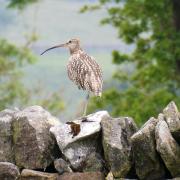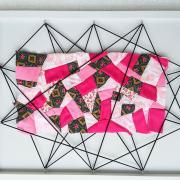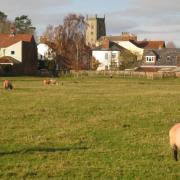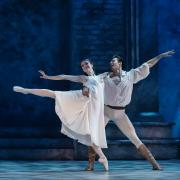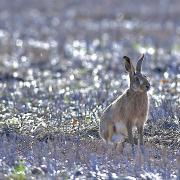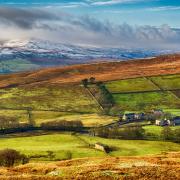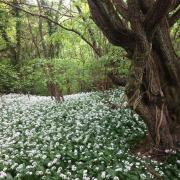Crime writer Helen Cadbury helps us launch a new series about Yorkshire-based authors and their favourite books. Interview by Jo Haywood. Photographs by Joan Russell

Overheard conversations and secret assignations behind closed doors are often key plot points in crime fiction, so it seems only right that Helen Cadbury’s first literary experience involved similar levels of subterfuge. ‘I have a vivid memory of illicitly listening to my dad reading The Lion, The Witch and The Wardrobe to my older brothers,’ she said. ‘At four, I was deemed too young, but I crouched behind the door and listened anyway. I think the secrecy only added to the experience.’
Secrets and lies now play an important part in her work as a crime writer, a career she came to later in life but which has brought her enviable success in a relatively short time. Her debut, To Catch a Rabbit, was joint winner of the Northern Crime Awards in 2012 and, after its re-release by a new publisher in 2015, was chosen as an Amazon Rising Star.
Her second novel Bones in the Nest, also featuring young Yorkshire copper Sean Denton, was published last summer, shortly before the rights for both books were bought by Red Planet Pictures, the production company behind BBC One’s Death in Paradise, with the aim of bringing Chasebridge, her fictional Doncaster estate, to the small screen.
But 2015 was not all rave reviews, TV deals and rocketing book sales. Exactly one week after the launch of Bones in the Nest, Helen was diagnosed with an aggressive form of breast cancer. She’s since had a single mastectomy and, when we meet at her home in Heworth, York, is halfway through a gruelling course of chemotherapy.

Not that you’d know it to look at her. Bustling around the kitchen preparing coffee, she seems positively buzzing with life and health. She claims it’s mainly down to her fabulous wig (‘it’s taken 10 years off me’) but it soon become apparent that it’s her natural verve, wit and passion for books that powers her through our long and joyously winding conversation (apologies to her dining companion who turned up for lunch only to find Yorkshire Life still lurking in the kitchen).
‘I’m actually feeling very well at the moment,’ said Helen, as we began perusing her bookcase, an artfully-constructed, multi-sectioned, wall-filler peppered with family memorabilia, photographs of her sons Isaac, 21, and Reuben, 18, and pots of wooden spoons beautifully carved by her husband, Josh, garden manager at The Croft in Malton.
‘I felt exhausted after my first course of treatment, only just recovering in time for the second. But I feel absolutely fine now, which is a real blessing. I suffer from a bit of chemo-brain, where words escape me for a moment, but other than that I feel just like myself.’
Words might wriggle from her grasp occasionally, but they remain an important part of her daily routine. She reads every day – a habit she developed from a precociously young age – and also tries to write every day, even if it’s only a couple of hundred words of her third Chasebridge novel between bouts of chemo-induced exhaustion.

‘I read a lot as a child,’ she said. ‘Ours was quite a noisy household, so it was nice to be able to escape by myself with a book. I adored Little Women, but my first big relationship with an author was actually with Laura Ingalls Wilder, beginning with Little House in the Big Woods.
‘She translates her world so brilliantly on to the page, and it was such a wonderfully alien world to me, a girl living in the centre of Birmingham where the prairies are a little sparse.
‘Laura is so feisty and strong, and there’s a real sense of jeopardy in her books – not everyone survives. But there’s also a lot of love and warmth. It was a world I could happily immerse myself in.’
When she was a little older, Helen was a huge fan of Sylvia Plath and wrote a lot of poetry, something that, later in life, laid the foundations for her career change from theatre-in-education, beginning with a creative writing course under the tutelage of York poet Carole Bromley, a poem published in the well-respected literary periodical Staple and a place on the shortlist of an international poetry competition.

But we’re jumping ahead. When not enjoying the angst of Plath, the young crime writer-in-the making was devouring Agatha Christie whodunits, losing herself in the modern mythology of Alan Garner’s The Owl Service, delving into the mind of Cass in Dodie Smith’s I Capture the Castle and wandering the moors with Elfine in Stella Gibbons’ Cold Comfort Farm.
‘When I was 12 my family moved from central Birmingham to a lonely hillside on Saddleworth Moor,’ she said. ‘I recognised the characters in the book and understood their motivation. My son Reuben is named after Reuben Starkadder, although I didn’t consciously connect the dots at the time.’
Helen enjoyed a varied and successful career as an actor and theatre-in-education tutor before signing up for an MA in creative writing at Sheffield Hallam University taught by Lesley Glaister, an author with 13 novels under her belt.
She had to produce a publication-ready novel as part of the course. That novel turned out to be To Catch a Rabbit, in which two young boys stumble across the body of a prostitute on the home patch of Sean Denton, Doncaster’s youngest community support officer. But why Doncaster?
‘I have spent a lot of time being bored and frozen while waiting for a train at Doncaster station,’ said Helen. ‘I very much like the town, but I grew to hate that station. I think setting my books there is a sort of revenge.’
The Chasebridge estate is a fictional creation but its bleak exterior, reflecting the even bleaker lives of the people who call it home, will strike a strong note of recognition, albeit a discordant one, with residents of pretty much any big town or city. It provides the perfect backdrop for her contemporary, issue-led crime novels – a genre echoed in her choice of reading matter.
‘King Suckerman by George Pelecanos (who went on to become a writer on The Wire) was my first introduction to this kind of raw crime fiction,’ said Helen. ‘It has so many layers and its characters are believably three-dimensional. There are incredible set-pieces and quite astonishing levels of violence, but he uses these devices to say something tangible about social issues.’
She also cites The Cutting Room by Louise Welch; a book that deals with heavy subjects like extreme porn and violence against women in a way that manages to be shocking without venturing into salacious voyeurism.
‘It’s one of the great challenges of crime writing that women are more likely to be victims than men. We have to reflect this while not being seen to somehow celebrate victimhood,’ said Helen. ‘I want to write about things I care about, and say things that need saying. It’s not easy, but it feels the right thing to do.’
So which of the many, many books she’s read over the years – the books crammed into her enviably capacious bookcase and standing in none-too-steady towers around her chair – would she have liked to have written?
‘I really admire David Peace and his book 1974 (the first part of the Yorkshire author’s highly-acclaimed Red Riding Quartet) is, without a doubt, the novel I wish I’d written,’ said Helen. ‘He refuses to self-censor and allows himself to venture into visceral territory.
‘He and I are just about contemporaries in terms of age, but he came to writing much earlier. I don’t honestly think I could have sat still long enough to write a novel before I hit 40. I could manage a poem, but not a book. I’m much happier in my own company now though. I can stay at home with the cat and characters in my head. They’re always surprisingly good company.’
Helen Cadbury’s novels To Catch a Rabbit and Bones in the Nest are published by Allison & Busby, priced £7.99. Her third Doncaster-based thriller is due out later this year. To find out more visit helencadbury.com
Share your favourite reads with us. Email feedback@yorkshirelife.co.uk, leave a comment below or tweet @Yorkshire_Life #bestreads




